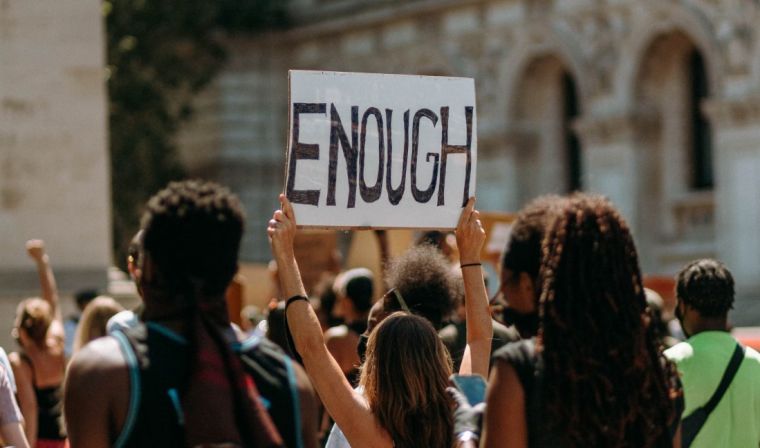Church must go beyond gestures in racism response, say black Christian leaders

A panel of black Christian leaders has called on the Church to go further in its pursuit of racial justice and repentance over its links to racism and slavery.
Rev Les Isaac, pioneer of Street Pastors, Marcia Dixon, Keep the Faith contributor and PR specialist, and David Shosanya, Regional Minister of the London Baptist Association, were in conversation at this week's national Christian Resources Exhibition.
Isaac spoke of the pain and confusion he experienced growing up in Britain as a black man and recounted shocking instances of racism after emigrating to Britain with his family from Antigua as a young boy.
These included one occasion when a teacher he had turned to for help held him down as he was beaten by four other youths.
He said the rejection of the Windrush generation by British churches had been "extremely painful", and that "white Jesus" had been a source of confusion for him as a child.
"I remember sitting in church as a nine-year-old and looking up and seeing this white Jesus and asking myself the question: how come Jesus looks like the people who hate me?" he said.
"To question Jesus being white was offensive, but to me as a young kid it was a real issue because of my experience at church, in school and on the street."
Isaac said he believed it was important that the Church of England pay some sort of financial reparation as part of its repentance for profiting from slavery.
"I think we can't just say sorry," he said.
"We're not asking to break the Anglican Church but the reality is that the Anglican Church benefited from slavery. A lot of money went into the Anglican Church through that.
"It's important to say: what can we do? And I would love to see the Church saying: we want to help educate children in the inner city and help them contribute to society.
"Repentance is not only about talking; it's about demonstrating as well."
Dixon said some progress was being made but there needed to be more, and that a public apology and "public act of repentance" would be helpful in breaking down the barriers around slavery that have disenfranchised some black people from the Church.
When asked about the Church of England's own admission of its failure to follow through on successive reports into institutional racism, she said it was important that churches be "intentional" about implementing recommendations.
"It's like you do the big gesture but you don't do the work of getting that information into your parishes to bring those recommendations to life," she said.
"Let's stop the big gestures. Let's get down to the nitty gritty. If you need to change the structures, change them," she said.
Shosanya said he wanted to see the Church move beyond the "optical illusion" of racial diversity.
"Black lives matter do matter but they often matter when white Christians want to be seen to be allies and their allyship is performative," he said.
Commenting on Black Lives Matter (BLM), Dixon said that the movement had helped bring recognition to the problem but that it was important for Christians to "reoccupy" the space of public protest on racial equality.
"What was good about BLM was that there was a rainbow colour of people saying we need to bring about a change. But it's important that the Church take central place again. Church leaders need to reoccupy that place and allow their voice to be heard," she said.
Shosanya explained why he found the 'all lives matter' response unhelpful: "When people say to me 'all lives matter', I say to them: I one hundred per cent agree with you so why do you treat black lives differently? If all lives matter, why do you allow people around you of a different colour to be treated differently? And why might you occasionally - inadvertently or intentionally - collude in that behaviour?"
Isaac said that while he did not agree with everything coming from BLM, the Church needed to ask itself why it had captured the imagination of so many black people.
"At the bottom of all of it is their disillusionment with the Church, with us Christians. So we need to inform and educate ourselves so that we can be part of the solution rather than part of the problem," he said.
For that to happen, Isaac said the Church must recognise and support the many gifted and talented people in the black community.
Practical measures could include providing apprenticeship and training opportunities for young black people, or simply sharing a meal together, he suggested.
"It's not about turning your organisation black. This is England; we're the minority here, we'll never be the majority," he said.
"And it's not about 'I want your power'. It's about how do we as the Church demonstrate that when you come into the Kingdom, there's justice, there's equality, there's righteousness and hope.
"There are black young people from the Caribbean who are contributing in a significant way to this nation, and as the Church, we've got to harness that and bring them in so that we can enrich the Kingdom of God.
"I want to encourage us as the Church: don't miss the opportunity and don't look at people because of the colour of their skin, but the content of their character, their abilities and the call of God that is on their lives."
He added, "If our nation had helped [the Windrush generation] to realise their full potential, Britain would be a different Britain today."











